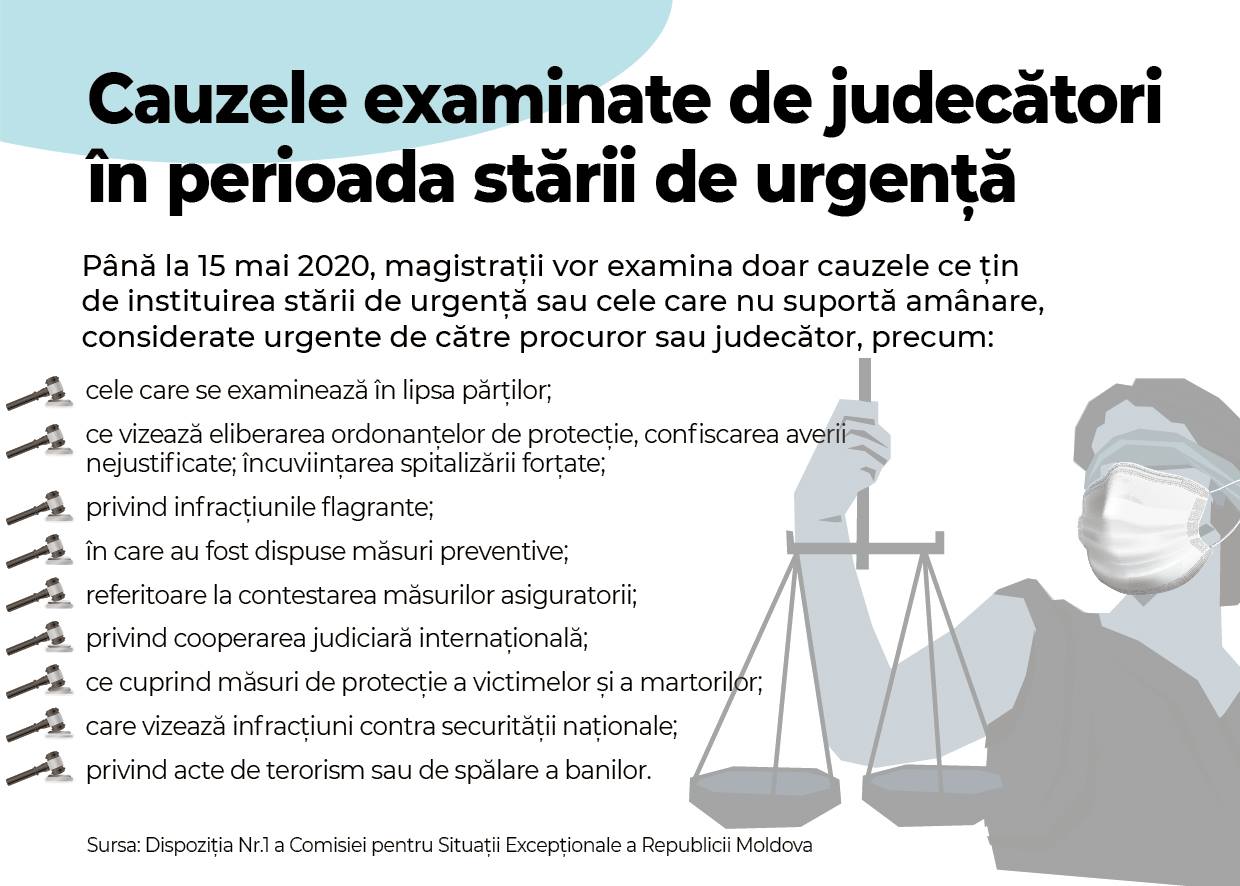back
National Campaign for Healthy Justice. Most legal institutions operate on a special schedule during the state of emergency

Until 15 May 2020, during the state of emergency due to the COVID-19 pandemic, prosecutors and judges will only examine cases that cannot be postponed.
Until 15 May 2020, during the state of emergency due to the COVID-19 pandemic, prosecutors and judges will only examine cases that cannot be postponed, such as those for the issuance of a protection order in domestic violence cases or those for preventive detention. Priority, however, will be given to appeals against offences committed during the state of emergency. Drastic fines of up to 50 thousand lei for individuals On 13 March this year, the authorities ordered the suspension of all religious activities. Eighteen priests in the country were fined up to 25,000 lei for organising religious services attended by several parishioners in violation of the ban until 9 April this year. According to the General Inspectorate of Police, priests from Drochia, Nisporeni, Causeni, Cantemir, Hincesti, Ialoveni districts, as well as from Botanica, Centru and Ciocana districts of Chisinau municipality were fined. The large fines were voted by lawmakers before the state of emergency was declared. Thus, Article 761 of the Contraventions Code was amended, which stipulates that failure by individuals to comply with measures for the prophylaxis, prevention and control of epidemic diseases may be sanctioned with a fine of between 22,500 and 25,000 lei. A similar fine may be imposed on individuals who deliberately submit false data in the epidemiological record or refuse to do so. Fines of up to 75,000 lei may be imposed on legal persons if they fail to comply with measures for the prophylaxis, prevention and control of epidemic diseases. The person fined is entitled to pay half of the fine if it is paid within 72 hours. Criminal penalties have also been increased. According to Article 215 of the Criminal Code, failure by an individual to comply with measures for the prevention or control of epidemic diseases, if it has caused the spread of such a disease, shall be punishable (maximum penalty) by a fine of up to 50,000 lei or imprisonment for up to 3 years. The same acts which have caused serious or medium injury to health or death of a person by negligence shall be punishable (maximum penalty) by imprisonment for up to 7 years. How to contest a fine during a state of emergency? The fine can be appealed within 48 hours. According to the provision No 4 of 24 March 2020 of the Commission for Exceptional Situations, the request for an appeal can be sent to the authority to which the official responsible for issuing the fine belongs by post or e-mail. Within 24 hours from the date of submission, the official shall send the appeal and the file of the infringement case to the competent court. If you were not present when you were fined and you find out about it later, you can appeal within 24 hours from the time you were made aware of the offence. In a state of urgency, the case is heard within 48 hours of the date the case is lodged with the court, but the judge may extend the time limit for hearing the case by up to 24 hours. Judgments on misdemeanour cases can be appealed to higher courts. Have your fundamental rights and freedoms been violated? Call the free "Hotline" 080080030 from landlines or mobile phones and we will help you to be heard and refer you to the relevant public institutions. Suspended cases During this period, cases that do not concern disputes during the state of emergency will not be examined by magistrates. Thus, the deadline for filing a lawsuit, the deadline for examining certain cases and other deadlines set by the courts are suspended and citizens will be able to go to court as soon as the state of emergency is lifted. There are, however, some exceptions. The Superior Council of Magistracy (SCM) has decided that from 7 to 17 April, all decisions concerning the work of judges will be taken by the heads of courts. At the same time, the SCM requires that judges and other court employees be called to duty only in urgent cases that cannot be postponed. Prosecutors also have a special schedule. Thus, the chief prosecutors of the territorial and specialised prosecutors' offices usually work from home, online or by telephone. At the same time, in case of citizens' referrals, a duty prosecutor will be appointed for trials that cannot be postponed. Ion Guzun, legal adviser at the Centre for Legal Resources in Moldova (CRJM), says that during the state of emergency, citizens have the same rights and guarantees, except that certain restrictions are imposed by the provisions of the Commission for Exceptional Situations: "The state has made sure, on the one hand, not to prevent people from having access to justice for certain cases, for example domestic violence. If, however, it is a matter of another offence which is not urgent, the public prosecutor's office registers it, but the examination period is extended". Priority will be given to trials relating to the imposition of a state of emergency, flagrante delicto and criminal cases where people are remanded in custody for an extended period. It will also examine cases concerning the issuance of protection orders, civil cases concerning the confiscation of unjustified assets, orders for forced hospitalisation, etc. Tip for citizens: check the websites of law institutions Luiza Gafton, interim president of the SCM, confirms that during the state of emergency, judges will only examine cases that cannot be postponed and advises citizens to check the SCM website frequently, as well as the websites of the courts, if they intend to file a request or if they already have a case pending. The magistrate points out that people can also submit an application electronically. Mariana Jacot